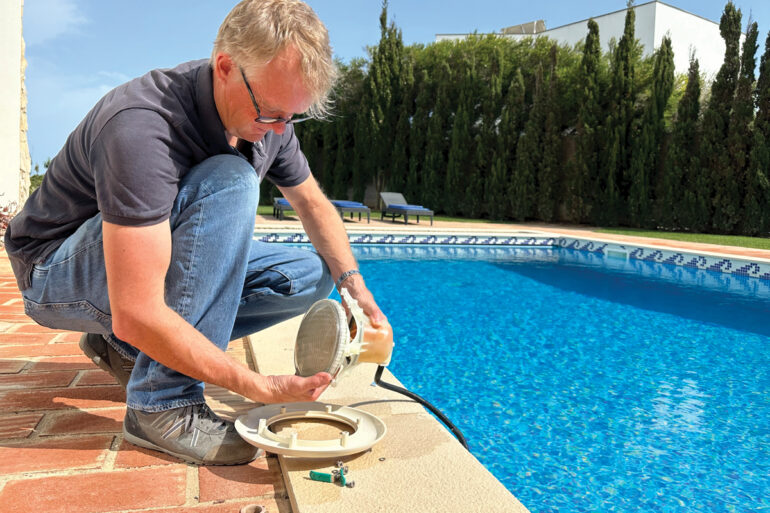A Texas-size Problem
Lack of equipment slowing pool pros nationwide

As difficult as it was to find certain essential supplies early in the pandemic, pool pros might dare say now that it’s even harder to find pool equipment.
“It’s just like toilet paper — once one person starts buying it, they start stocking up on it,” says Jon Krawczyk, owner of Superior Pools of Southwest Florida. “Then there’s a shortage. Everyone is stocking up on [pool materials] if they can.”
Ask any pool pro, and there’s a good chance they have equipment on backorder through 2022. It’s not making pool professionals happy, and it’s causing rifts with clients, too. While the pandemic may have kicked off the shortages, the industry keeps getting kicked, pool experts say.
Compounding Problems
For Pool Environments, Inc., in Plano, Texas, supply-chain issues started last summer.
Ted Anderson, vice president of Pool Environments, dealt with shortages from Hurricane Laura that took out a BioLab chlorine plant on the Gulf Coast in Louisiana last year. Suppliers have since been scrambling to get the normal flow of trichlor tablets back, he says: “Then, of course, we had the power outage in Texas.”
In February, Texas had an unprecedented ice storm that knocked out power for millions. This caused thousands of pools to freeze, breaking equipment like pumps, valves and pipes. The dire situation even called for Texas Governor Greg Abbott to grant provisional licensing to out-of-state plumbers to help Texans with plumbing issues. It also caused plastics manufacturers to shut down.
Texas pool owners have snapped PVC pipes and cracked equipment in their backyards. Experts estimate 20,000-plus pools are damaged in the Lone Star State, which put extra strain on pool equipment manufacturers on top of their already backlogged ordering due to the pandemic boom and shutdowns.
Some pools may remain inoperable for months as all types of equipment are on backorder from major manufacturers. Pool heaters and valves are especially difficult to find, is the consensus among pool pros. “We are doing everything we can,” says Nestor Reyes, a territory sales manager in Southwest Florida for Pentair. “We’re not the only ones dealing with this issue.”
Even items like pool light bulbs are becoming scarce, Krawczyk says. Some customers don’t understand why it is taking so long. He tells his customers he can order the part, but there is no guarantee when it will come in. For him, his priority is keeping pools serviced and getting people swimming, especially during humid Florida summers, but he hopes smaller problems aren’t going to thwart pool use. “A light bulb out isn’t going to stop someone from swimming,” Krawczyk laughs, referring to the calls of desperation he gets from clients who think lights are an emergency fix. “Unfortunately, some of them don’t understand. Some of them think the pandemic is over.”
For small independent owners like Anderson, fixing pools before mosquito season is a priority, even if it means connecting with parts companies that have old pumps and heaters sitting in a junkyard.
Anderson has techs bring broken equipment to his location to see if they can fix it to repair pools that are still not filtering or running. His first priority after the freeze was to get pumps and filters working so pools could be sanitized, even if it was a temporary fix. For homeowners who use his refurbished parts, Anderson is offering a discount if they purchase new equipment from him next year.
“It’s not optimal, but it might be the difference of getting someone up and running,” Anderson says. “You’ve got chlorine shortages and equipment shortages, and it’s a nightmare.”
Scrambling to Keep Up
With at least three factories operating 24/7, Reyes says Pentair is trying to meet industry demand for items like pool pumps. But a lack of factory line workers — both due to COVID and the increase in unemployment benefits — has made it hard to hire.
“We ship every day,” Reyes says of the products. “The problem is, we cannot keep up with the demand.” Builders tell him it will be the end of September or October before they can take on any more pools.
Troy Franzen, president of Fluidra North America, says Fluidra made strategic investments to keep up with increased demand, but unique challenges like weather events are nearly impossible to forecast. Franzen says his team is doing their best to meet customer expectations with what they can control and, thankfully, hasn’t had to limit orders.
“We are working under some supply constraints at the moment, but we have a plan in place to equitably distribute product across the U.S.,” he says. “And in the meantime, we’re looking into ways to adjust capacity and are being fully transparent with our customers in order to manage expectations. Communication really is the key here.”
Part of that communication includes regular reporting to distributors. Franzen says his distributors receive a product lead time report every two weeks, and they let customers know if there are circumstances that may affect deliveries. “Our customers understand the situation and know we’re in this together,” he says. “We’ve received feedback that they appreciate the detailed insight we provide.”

Franzen says the company is actively taking orders and fairly allocating products for customers across the United States. “Once we saw demand increase last year as homeowners began investing in their backyards, we immediately built up our supply-chain capacity,” he says. “We will be able to fulfill all orders; it’ll just take time.”
Time, though, is what the pool industry doesn’t have, Anderson warns. He is worried about his company and his friends in the business. Every client he loses to shortages and backlogs makes operating at a positive cash flow harder. He wants manufacturers to take more responsibility in informing the public about shortages. Anderson gets up to 150 emails daily and a constant stream of calls from customers demanding to know when their parts are arriving. Some customers have told Anderson and his team they believe they’re “playing it up” and aren’t trying hard enough to source the parts.
It’s gotten so bad that Anderson hired a public relations team to help him out. He wants customers to know nobody is doing this on purpose, but that “in general, manufacturers and suppliers need to be more helpful and make sure the public understands what goes on.”
Exhausting All Options
The equipment shortage is also forcing pool companies to source from multiple suppliers.
Ken Thompson, owner of Clarity Pool & Patio in northern Indiana, says he is having a hard time finding pumps, lights, heaters and heat pumps. In April, his main supplier had yet to receive its initial early-buy order of equipment from one of the big manufacturers, he says, which has forced Clarity to source product from four suppliers instead of one.
Pool pros may need to drive to get supplies within their own state or elsewhere, or order items like valves from Home Depot or Lowes. Anderson hired a full-time employee to simply connect with his friends and business acquaintances to source parts from California to North Carolina. In making those connections, he’s gotten over 180 pools up and running.
Longtime builders like Krawczyk also lean on industry connections. Thankfully, he had another family-run business, Florida Water Products, help him out with parts. Krawczyk says his manufacturer advised him to stock up on whatever it has available right now. His connections and proactive ordering practices are the only way to keep his company’s pool building from coming to a standstill, he says.
Refurbish and Reuse
While waiting out the shortages, some pool pros are refurbishing old parts to get pools running, but some don’t like the idea.
“That’s a gigantic bad decision,” says Harold Evans, owner of The Pool Surgeon and Orenda Technologies in Texas. “You’re voiding the warranty from the manufacturer. It’s a disservice to the customer. You’re absorbing the liability of the performance of the product. You modify something, you own it. You become more than a service provider — you become a manufacturer.”
Krawczyk echoes the statement: He wants to uphold his reputation for creating superior pools and believes others in the industry should keep the same standard — even if it does take a while.
“We sell the best stuff,” he says. “We build a pool for you to relax in, not work on. Just give them the best product. I never have had one customer come back and say they overpaid upfront.”
Anderson, however, says refurbishing pool parts is one of the ways his business is surviving. For clients with water features and other specialty pumps, it’s going to be 2022 before he does repairs. But those, he says, aren’t what matter for pool and community health when mosquito season is coming fast. Most suppliers are refusing to ship him parts from outside his state. Now, in addition to refurbishing parts, he has out-of-state friends going to their local suppliers, buy parts and ship them to Anderson.
Open communication industry experts say, is ultimately what will make the wait time on equipment shortages more tolerable. “Keeping our customers informed so they have realistic timelines and can plan accordingly has been imperative to instilling trust,” Franzen says, “and maintaining the strong relationships we have with our customers.”







